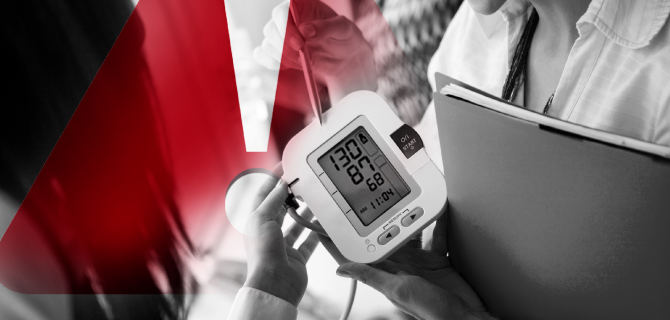Low blood pressure, or hypotension, is often seen as a harmless condition, especially compared to high blood pressure (hypertension). However, hypotension can pose significant health risks and lead to various complications if not managed properly. This comprehensive article explores the reasons why low blood pressure is detrimental to health, the symptoms it can cause, and the potential long-term effects.
Understanding Low Blood Pressure
Blood pressure is the force exerted by circulating blood on the walls of blood vessels. It is measured in millimeters of mercury (mmHg) and is expressed as two numbers: systolic (the top number) and diastolic (the bottom number). Normal blood pressure is typically around 120/80 mmHg. Blood pressure is considered low if it is consistently below 90/60 mmHg.
The Risks And Complications of Low Blood Pressure
1. Dizziness and Fainting
One of the most common symptoms of low blood pressure is dizziness or lightheadedness, which can occur especially when standing up quickly from a sitting or lying position—a condition known as orthostatic hypotension. This happens because the body’s regulatory mechanisms struggle to adjust blood flow and maintain adequate brain perfusion when changing positions. In severe cases, this can lead to fainting (syncope), which can result in falls and injuries.
SEE ALSO: Why Is My Blood Pressure Low When I Wake Up?
2. Fatigue and Weakness
Chronic low blood pressure can lead to persistent fatigue and weakness. The reduced blood flow to vital organs can result in decreased energy levels, making it challenging to perform daily activities. This is because the organs and tissues are not receiving the optimal amount of oxygen and nutrients necessary for energy production and overall function.
3. Impaired Cognitive Function
Low blood pressure can affect cognitive functions such as concentration, memory, and mental clarity. Insufficient blood flow to the brain may lead to confusion, difficulty concentrating, and even cognitive impairment in severe cases. This can impact quality of life, productivity, and overall mental well-being.
4. Cardiovascular Issues
While high blood pressure is commonly associated with cardiovascular diseases, low blood pressure can also be problematic. In severe cases, hypotension can lead to inadequate perfusion of the heart muscle, which might contribute to conditions such as heart failure. Additionally, individuals with chronic low blood pressure are at an increased risk of developing complications from other cardiovascular issues.
5. Shock
In extreme cases, very low blood pressure can lead to shock—a life-threatening condition characterized by a significant drop in blood flow to vital organs. Shock can result from severe dehydration, blood loss, or infections, and requires immediate medical attention. Symptoms of shock include rapid heartbeat, shallow breathing, confusion, and weakness.
Causes of Low Blood Pressure
Low blood pressure can be caused by a variety of factors, including:
Dehydration: When the body loses more fluids than it takes in, it can lead to a decrease in blood volume, resulting in lower blood pressure.
Heart Conditions: Certain heart conditions, such as extremely low heart rate (bradycardia), heart valve problems, or heart attack, can lead to low blood pressure.
Endocrine Problems: Disorders of the endocrine system, such as thyroid problems, adrenal insufficiency (Addison’s disease), or low blood sugar (hypoglycemia), can cause hypotension.
Medications: Some medications, such as diuretics, alpha-blockers, beta-blockers, and antidepressants, can lower blood pressure as a side effect.
Nutritional Deficiencies: Lack of essential nutrients, including vitamin B12 and folate, can affect red blood cell production and lead to low blood pressure.
Severe Infection (Septicemia): When an infection enters the bloodstream, it can lead to a drop in blood pressure.
Managing And Treating Low Blood Pressure
1. Lifestyle Changes
Increase Fluid Intake: Drinking more fluids can help increase blood volume and prevent dehydration, which is essential in managing low blood pressure.
Eat Small, Frequent Meals: Eating smaller meals more frequently can help prevent postprandial hypotension (a drop in blood pressure after eating).
Consume More Salt: Increasing salt intake can help raise blood pressure, but this should be done under medical supervision to avoid potential complications.
2. Medications
In some cases, medications may be prescribed to treat low blood pressure. These might include:
Fludrocortisone: A corticosteroid that helps increase blood volume.
Midodrine: A medication that constricts blood vessels to raise blood pressure.
Erythropoietin: For individuals with anemia-related low blood pressure.
3. Medical Treatment
Addressing underlying conditions that contribute to low blood pressure is crucial. Treatment might involve managing heart conditions, thyroid disorders, or infections. Regular monitoring and adjustments to treatment plans can help manage symptoms effectively.
Conclusion
Low blood pressure, while often less discussed than high blood pressure, can have significant implications for overall health. The risks associated with hypotension—including dizziness, fatigue, cognitive impairment, cardiovascular issues, and severe complications like shock—underscore the importance of understanding and managing this condition.

